Workers and Students Stand with Palestine
•
Longshore Workers Honor Picket and Refuse to Unload Israeli Ship
•
End the Siege On Gaza! End U.S. Support for Israeli Genocide And Occupation! • Those Defending Gaza Refuse to be Silenced
• University of Illinois On Notice for Academic Freedom Violations • A Call To People Of Conscience Not To Speak At The University Of Illinois Urbana-Champaign Until Chancellor Wise Honors The Contract To Hire Professor Steven Salaita • Does the Firing of Steven Salaita Mean Another Blacklist?
Oakland, California Picket Defends Palestine
Longshore Workers Honor Picket and Refuse to Unload Israeli Ship
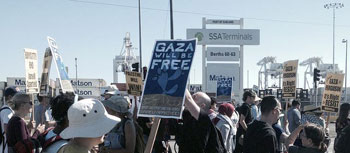 Hundreds of defenders of Palestine and anti-war activists organized a picket line at the Port of Oakland Saturday, August 16 to protest the docking of the Piraeus operated by Israel’s Zim Integrated Shipping Services. They called on all to condemn U.S. aid and support for Israel and to refuse to support the Zionists as long as they continued the blockade of Gaza and occupation of Palestine. Longshoremen, with a long history of honoring such picket lines, refused to cross the line. The ship remained unloaded, in port, paying docking fees. Protesters kept up their line.
Hundreds of defenders of Palestine and anti-war activists organized a picket line at the Port of Oakland Saturday, August 16 to protest the docking of the Piraeus operated by Israel’s Zim Integrated Shipping Services. They called on all to condemn U.S. aid and support for Israel and to refuse to support the Zionists as long as they continued the blockade of Gaza and occupation of Palestine. Longshoremen, with a long history of honoring such picket lines, refused to cross the line. The ship remained unloaded, in port, paying docking fees. Protesters kept up their line.
By late Monday, about 20 demonstrators remained and more than 100 police. Longshoremen still refused to cross the line. “We will not work under armed police escort — not with our experience with the police in this community,” International Longshore and Warehouse Union (ILWU) Local 10 President Melvin MacKay said in a statement. In a 2003 anti-war picket of hundreds blocking the sending of arms and supplies to Iraq, Oakland police fired rubber bullets at workers and demonstrators, injuring many. “The community demonstrators, though peaceful, were outnumbered 5-1 by more than 100 police officers from the Alameda County Sheriff’s Office and the city of Oakland,” the ILWU stated.
On Tuesday protestors organized a 5am picket and longshoremen again refused to cross it. Protesters and workers recalled other similar actions to block the unloading of ships from apartheid South Africa in 1984 and expressed their rejection of today’s U.S./Israeli apartheid in Palestine, with the apartheid wall and Palestinian-only checkpoints and Israeli-only roads. The action specifically targeted the months-long genocidal bombardment and ground attack by the Zionists against Gaza. Protests defending Palestine and in solidarity with the west coast action were also held in New York City.
In a maneuver that showed protesters had succeeded in blocking unloading, Zim reported the ship was leaving Oakland for Los Angeles and it left the Oakland port Tuesday afternoon. Almost 20 miles into the voyage, the vessel turned around, arriving back at the Oakland port about 6:30 p.m. It was eventually unloaded that evening.
Protesters however considered it an important success to have united with the longshore workers and forced the ship to pay port fees and be delayed for four days. Their success had a direct impact on a second Zim vessel, the Chicago, which was delayed before even reaching port in order to avoid protesters.
“Delaying even by one hour costs Zim money. Delaying for days causes a significant expense and sends a clear message that there will be no business as usual with Israel as long as it blockades the Gaza Strip,” said Nada Elia, an organizer of the blockade.
 For the Saturday August 24, 8am longshore work shift in Tacoma, Washington, at least 150 activists blocked both of the entry gates for longshore workers at the Washington United Terminal (WUT) where the Zim ship was docked. The picket closed both gates, and the work of unloading the Zim Chicago ship was delayed. According to demonstrators, workers were then snuck in through an entirely different terminal, a very unusual action. However, to do this the Port of Tacoma and the Zim company delayed the arrival of the Zim Chicago ship for days until August 23 when that alternate terminal was empty of any scheduled ships.
For the Saturday August 24, 8am longshore work shift in Tacoma, Washington, at least 150 activists blocked both of the entry gates for longshore workers at the Washington United Terminal (WUT) where the Zim ship was docked. The picket closed both gates, and the work of unloading the Zim Chicago ship was delayed. According to demonstrators, workers were then snuck in through an entirely different terminal, a very unusual action. However, to do this the Port of Tacoma and the Zim company delayed the arrival of the Zim Chicago ship for days until August 23 when that alternate terminal was empty of any scheduled ships.
At the Saturday, 6 PM longshore workers’ shift, the blockaders employed a mobile strategy using cars and bicycles to move their blockade rapidly between terminal gates. It turned out that the Port of Tacoma had opened at least seven terminal gates for this purpose, some of which had not been used in years or decades and were unknown to many staff. Blockaders managed to be at all of them, turning away some cars and facing physical aggression from police. The work of unloading the Zim Chicago ship was once again delayed.
Overall the stand is clear: Zionists are not welcome in U.S. ports.
[TOP]
End the Siege On Gaza! End U.S. Support for Israeli Genocide And Occupation!
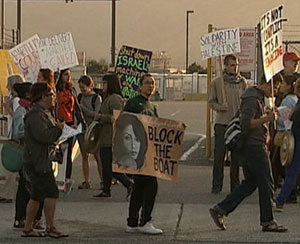 When the “Zim Chicago” enters the Port of Tacoma and the Port of Seattle, we will conduct blockades to prevent the unloading of its cargo, starting early and lasting all day. These actions are economic sanctions against Zim Shipping, Israel’s largest shipping company, in response to the current siege of Gaza and the ongoing occupation of Palestine. Any international commerce that profits Israeli companies is oppressing Palestinians. Israel could not continue its occupation and genocide without economic and military support of the United States government. To help end this oppression we must block that support in every way we can.
When the “Zim Chicago” enters the Port of Tacoma and the Port of Seattle, we will conduct blockades to prevent the unloading of its cargo, starting early and lasting all day. These actions are economic sanctions against Zim Shipping, Israel’s largest shipping company, in response to the current siege of Gaza and the ongoing occupation of Palestine. Any international commerce that profits Israeli companies is oppressing Palestinians. Israel could not continue its occupation and genocide without economic and military support of the United States government. To help end this oppression we must block that support in every way we can.
The toll of “Operation Protective Edge” is more than 2,000 Gazans killed (nearly all civilians), 31percent of them children, and almost 10,000 injured. We must act in solidarity with those in Palestine who live under occupation and are facing down genocide. Let’s refuse to let Israeli ships use our ports! Blockade until they go away! Oakland, California blocked a Zim ship on August 16 [successfully stopping the unloading for four days]. In Seattle we shut down the Port for a day in December of 2011 — we can do it again and again. Blockades can and must happen everywhere there is a port, as a contribution to the goal of the collapse of the economic base of Israeli occupation.
We cannot do this without your presence! Everyone is welcome, young and old. Bring banners, flags, flyers, sound systems, musical instruments, and your friends. If you cannot blockade, you can participate in the supporting rallies — the more people there, the safer we will all be.
Comments, questions, or suggestions? Want to work together? Contact blocktheboatnw@gmail.com. This website will continue to be updated.
[TOP]
Students Demand University of Illinois Rehire Professor Salaita
Those Defending Gaza Refuse to be Silenced
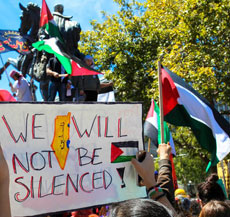 On August 22, students demanded that Professor Steven Salaita, fired from a tenured position for taking a stand in support of Gaza, be rehired. The students went directly to the board of trustees of the University of Illinois. They represent the outrage among many at the Urbana-Champaign campus at the firing of Salaita. There is also a rapidly developing national and international boycott of University of Illinois at Urbana-Champaign (UIUC). Supporters have set up a website (supportstevensalaita.com) to provide information about Salaita’s case, offer links to relevant articles, suggest actions and to raise money for his defense.
On August 22, students demanded that Professor Steven Salaita, fired from a tenured position for taking a stand in support of Gaza, be rehired. The students went directly to the board of trustees of the University of Illinois. They represent the outrage among many at the Urbana-Champaign campus at the firing of Salaita. There is also a rapidly developing national and international boycott of University of Illinois at Urbana-Champaign (UIUC). Supporters have set up a website (supportstevensalaita.com) to provide information about Salaita’s case, offer links to relevant articles, suggest actions and to raise money for his defense.
University of Illinois at Urbana-Champaign (UIUC) Chancellor Phyllis Wise claimed she fired Salaita for a lack of “civility,” in various twitter comments. “Civility” is a vague standard that has been invoked to censor other critics of the U.S./Zionist attacks on Palestine in the past.
As the university board of trustees’ executive committee met August 22 the students first entered the room and demanded to be heard. The students were then forced to leave as the meeting went into closed session. They staged a sit-in in the hallway outside the meeting room hoping to encounter participants as they left. However, the participants used a private back exit to leave and refused to see the students.
Students entered the room and read their statement as part of making clear that their demands will be heard. Their full statement, posted on Facebook, includes the following calls:
• The immediate reinstatement of Dr. Salaita as a tenured faculty member in the Department of American Indian Studies.
• Full and fair compensation to Dr. Salaita for time missed during which he would otherwise have been working.
• Immediate increased transparency in the faculty hiring process – as a public university, UIUC has the responsibility to make public all intended faculty changes as well as take public comment in regards to any change.
The students also call for specific mechanisms to guarantee more transparent and inclusive governance and oversight and “a full revision of the UIUC Resolution on Diversity Values Statement ensuring that political beliefs are explicitly protected by the university.” They also demanded that “political statements made by UIUC community members will not in any way be considered grounds for termination, suspension, revocation of offered employment, or any other disciplinary action.”
The American Indian Studies Program faculty at UIUC, which Salaita had been expected to join, passed a vote of no confidence in Wise and defended Salaita.
“Our sentiment is based on Wise’s decision to effectively fire Professor Steven Salaita, whose de facto hire had been properly vetted by the unit and approved by the college through standard academic procedures,” says a statement on the program’s website.
The statement adds that the faculty believe Wise’s decision “was in fact made in response to external pressures that sought to block Professor Salaita’s hire, coupled with her objection over the content and tone of his personal and political tweets on the subject of the Israeli bombing of Palestine.”
“With this vote of no confidence, the faculty of UIUC’s American Indian Studies program also joins the thousands of scholars and organizations in the United States and across the world in seeing the Chancellor’s action as a violation of academic freedom and freedom of speech,” the statement said.
[TOP]
American Association of University Professors
University of Illinois On Notice for Academic Freedom Violations
 The American Association of University Professors (AAUP) released a letter August 29 addressed to Chancellor Phyllis Wise of the University of Illinois Urbana-Champaign (UIUC) regarding Professor Steven Salaita’s case. He was fired for expressing his support for Palestinians. In the letter, Associate Secretary Anita Levy articulates the facts of the case and connects them to other important cases of academic freedom violations and employment. She then speaks specifically to Salaita’s situation:
The American Association of University Professors (AAUP) released a letter August 29 addressed to Chancellor Phyllis Wise of the University of Illinois Urbana-Champaign (UIUC) regarding Professor Steven Salaita’s case. He was fired for expressing his support for Palestinians. In the letter, Associate Secretary Anita Levy articulates the facts of the case and connects them to other important cases of academic freedom violations and employment. She then speaks specifically to Salaita’s situation:
“We are deeply concerned about the action taken against Professor Salaita. Long after he was offered and accepted a tenured position, specific arrangements were made regarding courses, schedules, and salary. The exchange of letters — between Interim Dean Ross and Professor Salaita — appears to have been in accordance with generally established procedures by which academic appointments are tendered and accepted. Ten months elapsed during which time no one in the university administration gave any indication that the appointment as agreed upon might not be brought before the board."
The letter adds that speech exercised by professors outside the classroom, when they are acting as individuals, is not grounds for dismissal. Rather they are part of their right to free speech. The letter closes with the following statement and demand that the University meet its obligations to pay Steve per the terms of his employment contract:
“Until these issues have been resolved, we look upon Professor Salaita’s situation as that of a faculty member suspended from his academic responsibilities pending a hearing on his fitness to continue. Under the joint 1958 Statement on Procedural Standards in Faculty Dismissal Proceedings, any such suspension is to be with pay. As detailed earlier in this letter, Professor Salaita has incurred major financial expenses since he accepted the University of Illinois offer. We urge – indeed insist – that he be paid salary as set in the terms of the appointment pending the result of the CAFT proceeding.”
Dr. Levy asks for a “prompt response” from the Chancellor. The letter in its entirety can be found at:
http://www.aaup.org/file/AAUPLetterChancellorWise.pdf
[TOP]
American Studies Association Executive Committee Statement on the Salaita Case
 The Executive Committee of the American Studies Association, which represents over 5000 scholars of American Studies around the world, protests the decision of University of Illinois Chancellor Phyllis Wise to rescind the offer of a tenured faculty position in American Indian Studies to highly regarded ASA member Professor Steven Salaita.
The Executive Committee of the American Studies Association, which represents over 5000 scholars of American Studies around the world, protests the decision of University of Illinois Chancellor Phyllis Wise to rescind the offer of a tenured faculty position in American Indian Studies to highly regarded ASA member Professor Steven Salaita.
Professor Salaita was offered the position in October 2013 following a national search and evaluation of his scholarship based on its merit and contributions to comparative indigenous studies. The administration’s action in rescinding the offer in August 2014, after Prof. Salaita had resigned his tenured position at Virginia Tech, and just days before his classes were set to begin at UIUC, sets a dangerous precedent. This last minute top down decision with no faculty consultation and no reason provided violates the tenets of faculty governance. Alarmingly, these actions constitute as well a de facto assault against the Program in American Indian Studies at UIUC despite its carefully earned status as one of the leading intellectual programs nationally in its field. This decision if not overturned is sure to erode the confidence of scholars and students of American Indian and Indigenous Studies that UIUC is an open and welcoming institution that values equally their social, cultural and intellectual contributions. Additionally, if, as reported, the offer was rescinded based on Prof. Salaita’s twitter feed and opposition to the Israeli invasion of Gaza, the university’s actions constitute a clear violation of the principles of academic freedom, contravene the University’s self-proclaimed valuing of diversity, and suggest an intolerable anti-Arab bias.
We call upon you to restore faculty governance, to respect the Department of American Indian Studies and the faculty peer review process in evaluating faculty for tenured positions, and to begin to rebuild the UIUC’s reputation as an institution of academic excellence by restoring Professor Steven Salaita as a tenured associate professor of American Indian Studies at UIUC.
[TOP]
A Call To People Of Conscience
Not To Speak
At The University Of Illinois Urbana-Champaign Until Chancellor Wise Honors The Contract To Hire Professor Steven Salaita
In solidarity with the Campus Faculty Association of the University of Illinois at Urbana-Champaign (UIUC), which has called upon Chancellor Wise to reverse her decision to revoke the offer of appointment made to Professor Steven Salaita in October 2013, and in consultation with concerned faculty members at UIUC.(Already signed by close to 1800 professors across the country and worldwide, with more to come.)
***
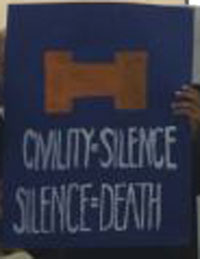 Whereas academic freedom and the protection of First Amendment rights to free speech, and a commitment to fairness and transparency in all academic procedures and practices, including faculty hires and other labor practices, form the foundations of the American public higher educational system;
Whereas academic freedom and the protection of First Amendment rights to free speech, and a commitment to fairness and transparency in all academic procedures and practices, including faculty hires and other labor practices, form the foundations of the American public higher educational system;
Whereas Professor Salaita is a leading scholar in comparative ethnic, Arab American, indigenous, and American studies, whose pathbreaking and prolific scholarship has put him at the forefront of these fields and led to the offer of employment at UIUC;
Whereas, the University's College of Liberal Arts and Sciences made an offer to Dr. Steven Salaita for an appointment, with tenure, as Associate Professor in the College's American Indian Studies program, after the customary full review; he soon after accepted the offer, which the University confirmed in writing, and resigned from his tenured position in the English Department at Virginia Tech University. The appointment was then without explanation was unilaterally withdrawn by Chancellor Phyllis Wise from consideration by the Board of Trustee, thereby undermining every preceding review by faculty and decanal personnel;
Whereas news reports from several reputable sources such as Inside Higher Education assert that the administrative decision of Chancellor Wise to block Professor Salaita’s employment at UIUC was a response to complaints about his postings to twitter.com;
Whereas the AAUP’s 1940 “Statement of Principles on Academic Freedom and Tenure” explicitly states that when faculty “speak or write as citizens, they should be free from institutional censorship”;
Whereas AAUP has stated that therefore “there is good reason to fear that Professor Salaita's academic freedom and possibly that of the Illinois faculty members who recommended hiring him have been violated.”
Whereas the administrative revocation of Professor Salaita’s contract constitutes a significant assault on the autonomy of the American Indian Studies, is an obvious breach of the principle of faculty self-governance, and is detrimental to the effective operation of academic units;
Whereas students and scholars have the right to intellectual freedom, the responsibility to voice public positions on controversial matters, and the freedom to express dissent independent of their university roles and affiliations;
Whereas students and scholars have the right to pursue education and research without institutional interference, repression, and harassment when they take public positions in solidarity with Palestinians;
It is resolved that we endorse and honor a boycott of the University of Illinois Urbana-Champaign. It is also resolved that we support the protected rights of students and scholars everywhere to engage in research and public speaking about Israel-Palestine free from threats and intimidation;
We, the undersigned faculty and staff, will not give guest lectures or provide public speeches at The University of Illinois Urbana-Champaign. We encourage all signatories of this statement to use their own judgment as to what other forms of protest and boycott they wish to employ on a case-by-case basis. We ask that faculty and administrators honor the boycott until Professor Steven Salaita is made a formal and binding offer of employment with tenure, exactly the same offer that has been revoked. We furthermore demand that the University vow that no retaliation or other negative actions, explicit or implicit, direct or indirect, be visited upon Professor Salaita or any of his supporters amongst the faculty or student body at UIUC.
Background And Links
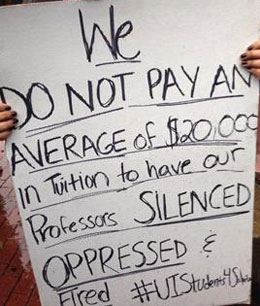 UIUC has shown itself hostile to pro-Palestinian faculty by violating a faculty member’s protected rights. The University’s actions in this case are racist, violating faculty members’ protected rights to freedom of expression and throwing their legally protected personal and academic freedoms under the bus when confronted with public pressure. For daring to vocally support Palestinian rights to freedom, Professor Salaita currently has no job, no home of his own, and no health insurance.
UIUC has shown itself hostile to pro-Palestinian faculty by violating a faculty member’s protected rights. The University’s actions in this case are racist, violating faculty members’ protected rights to freedom of expression and throwing their legally protected personal and academic freedoms under the bus when confronted with public pressure. For daring to vocally support Palestinian rights to freedom, Professor Salaita currently has no job, no home of his own, and no health insurance.
Professor Salaita’s expulsion from UIUC is part of a larger pattern of systematic squelching of free speech that, in effect, supports human rights violations against Palestinians. At stake is the preservation of the university’s integrity in which critical thought should flourish, not be monitored and punished, especially when expressed in spaces (such as social media) that are and must remain outside the university’s purview when they are venues for faculty to express their political views. Professor Salaita’s online speech and political activism are protected under the First Amendment of the U.S. Constitution. His statements were political views, worthy of the highest constitutional protection, and UIUC’s attack on this speech, based on the administration’s approval or disapproval of faculty’s statements on social media, represents an unconstitutional violation of First Amendment rights. As the Center for Constitutional Rights has explained, regarding Professor Salaita’s case, the actions of the University of Illinois Chancellor’s office “have inflicted serious damage not just on one scholar; they have set [the] University [of Illinois] on an unsustainable course charted against elementary constitutional principles.” The only honorable course of action would be to reinstate Professor Salaita, and to hold open discussion at the campus of anti-Arab racism and the protected right of Palestinians and Arabs and their supporters to free speech.
USACBI Statement on the Firing of Professor Salaita
http://www.jadaliyya.com/pages/index/18842/usacbi-condemns-uiuc-firing-of-arab-american-schol
Initial Coverage from Inside Higher Ed
http://www.insidehighered.com/news/2014/08/06/u-illinois-apparently-revokes-job-offer-controversial-scholar
AAUP’s Defense of Professor Salaita
http://www.aaup.org/media-release/statement-case-steven-salaita
Letter to UIUC Chancellor Phyllis Wise from Committee for Open Discussion of Zionism (CODZ)
http://codzorg.files.wordpress.com/2014/08/codz-letter-to-uiuc-chancellor-wise-letterhead1.pdf
Growing Boycott Movement Over the Firing of Steven Salaita
http://electronicintifada.net/blogs/ali-abunimah/univ-illinois-faces-growing-boycott-over-firing-palestinian-american-professor
Academic Freedom in the Salaita Case
http://verdict.justia.com/2014/08/13/academic-freedom-salaita-
case?utm_source=feedburner&utm_medium=feed&utm_campaign=Feed%3A+V
erdict+%28Verdict+%7C+Legal+Analysis+and+Commentary+from+Justia%29
(Additional signatures from scholars and academics are welcome! Please email frederick.moten@ucr.edu or go to https://docs.google.com/forms/d/1_oGbCNTx7lcvYzQP_kDEZbfclDdu5-GU_HIfCUKfIGQ/viewform)
[TOP]
Does the Firing of Steven Salaita Mean Another Blacklist?
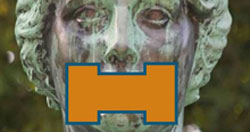 Steven Salaita, an Arab-American Professor of American Indian Studies, was fired from his job for tweeting criticisms of the Israeli massacre in Gaza. The University of Illinois, which fired Salaita, will try to tell you his job was ‘rescinded.’ But he was fired.
Steven Salaita, an Arab-American Professor of American Indian Studies, was fired from his job for tweeting criticisms of the Israeli massacre in Gaza. The University of Illinois, which fired Salaita, will try to tell you his job was ‘rescinded.’ But he was fired.
Here’s why the University and mainstream media do not want to say he was fired.
Because firing a tenured professor purely for his political opinions, especially one with multiple academic publications to his record, means the University has violated the following:
1) His First amendment rights.
2) His academic freedom.
3) His rights as an employee at a public university, as well his rights to due process. […]
This incident signals the following:
• For those of us who have tenure in the academy, it tells us that our private expressions on social media may now outweigh our academic work.
Steven Salaita has published six academic monographs of distinction. He was in fact hired for his scholarly excellence. Clearly, his firing had nothing to do with that work. If Salaita’s case is established as precedent, comments we make on our own time can be used by the University to monitor us and ultimately to fire us.
• For those of us who do not have tenure in the academy, or are doing graduate work, Salaita’s case is a clear gag order. Everyone already knows the high levels of stress and anxiety faced by untenured faculty produced by micro-level monitoring of social and professional behavior. Salaita’s firing proves that our worst nightmares are true: University administrations are keeping track of what we do and say, even outside of work.
• Salaita’s case also has specific implications for faculty of color and minority faculty. Cary Nelson, a past president of the American Association of University Professors, has charged that Salaita’s social media expressions fail some standard of “civility” and “collegiality.”
These terms are typically used to deny tenure and promotion to women and minority faculty.
As we all know, professors as a social group (including Professor Cary Nelson) are rarely known for their social graces. Using language of “incivility” is clearly a signal that some ‘some groups’ lack the right ‘cultural grooming’ to join the academic club.
Anstup Basu, a faculty member in the Department of English at UIUC, and a colleague of Cary Nelson, told us:
“[As regards] the nebulous charges pertaining to ‘civility’ and ‘tone.’ Who decides such standards and protocols in the public sphere? Like all of us, Salaita publishes his excellent academic work following the language games of the academy. But when it comes to his extramural presence in the wider public sphere, who are we to institutionally determine what language he should use and what tone? How can it be the University of Illinois’ or anyone else’s business to judge and police it? I therefore strongly feel that such charges of ‘uncivility’ begin from a patronizing position of majoritarian power, particularly because the issue at hand is one of colonial occupation and apartheid.
“As we know, we have a long history of voices from margins being silenced and condemned by those in power precisely on the grounds of civility, propriety of language, and tone. From Churchill’s complaints about Gandhi’s ‘loincloth’ to relentless patronizing censures of rap lyrics and Black culture, where do we begin, and where exactly do we draw the line?
“This is a matter of deep shame for a world class research University. The decision should be revoked immediately and a formal apology issued.”
[…] Michael Rothberg is the Head of the Department of English at UIUC and the Director of the Initiative in Holocaust, Genocide, and Memory Studies. He has made the following public statement in support of Salaita:
 “I have reviewed a large number of tweets sent by Professor Salaita during recent weeks. While I understand that they are partisan and angry messages — and therefore may be considered controversial — I do not agree that anything written there warrants firing or rescinding an offer that was already promised. Indeed, if academic freedom and the right to free speech do not guarantee controversial and offensive political expression — and especially expression outside the classroom — what are they good for?”
“I have reviewed a large number of tweets sent by Professor Salaita during recent weeks. While I understand that they are partisan and angry messages — and therefore may be considered controversial — I do not agree that anything written there warrants firing or rescinding an offer that was already promised. Indeed, if academic freedom and the right to free speech do not guarantee controversial and offensive political expression — and especially expression outside the classroom — what are they good for?”
Steven Salaita was a tenured Associate Professor who accepted one job and resigned another. In between, he was fired. He now has no job, no personal home to live in, and no insurance for his family, including his two year-old son.
The most important political lesson of the Salaita case is this: that criticizing the crimes of the Israeli state is the new McCarthyism.
Steven Salaita is being fired because, much like suspected Communist sympathy during the Cold War, support for Palestine is the “third rail” of political expression from which Universities continue to retract their professed support for both academic freedom and free speech.
As eminent McCarthyism scholar Ellen Schrecker has written of Cold War anti-Communism:
“The academic community was as deeply involved in this process as any other segment of American society. In their willingness to punish the men and women who were fingered by the anticommunist professionals during the first stage of the operation, the nation’s educational leaders differed little from the movie moguls who imposed the Hollywood blacklist or the state and federal bureaucrats who fired people on the word of anonymous informers.
“Academic freedom was no protection…it proved to be a highly malleable concept that could be manipulated to justify the exclusion of alleged Communists from the nation’s campuses.”
University of Illinois has not just fired Steven Salaita. It is trying to blacklist him. His firing is part of an ongoing effort by ally states and their institutional proxies to punish critics of Israel, be it at demonstrations on the streets of London, Paris or Cairo, or in the halls of the University.
Salaita’s case also proves a crucial point of the Boycott, Divestment, Sanctions movement against Israel: that universities are not ‘neutral venues.’
Indeed, University of Illinois Chancellor Phyllis Wise who notified Salaita that he was fired, strongly opposed the American Studies Association (ASA) vote to boycott Israeli Universities last December. Steven played a leading role in the ASA boycott campaign and has written extensively about why such a campaign was necessary. […]
[There has been a] public outpouring of support for this Palestinian scholar and vocal critic of Israel. People are leaving angry comments in support of Salaita in the UIUC facebook page. One parent, Leighann Jones, wrote:
“I am sending my daughter to you with the expectation that she will receive the best education that we can provide her. I am disheartened to read this afternoon that Chancellor Wise rescinded an offer to hire Steven Salaita based solely on his views of the Israeli attacks on Gaza. My daughter’s first lesson: Keep your mouth shut, or else.”
The public outcry has exposed the silencing and intimidation that University administrators and powerful institutions have historically used against people who stand for Palestine. And we need to keep speaking out. Steven Salaita must have his job back. Until then our work is not done.
(Tithi Bhattacharya is a Professor of South Asian History at Purdue University, a long time activist for Palestinian justice; Bill V. Mullen is a Professor of American Studies at Purdue University.)
[TOP]
